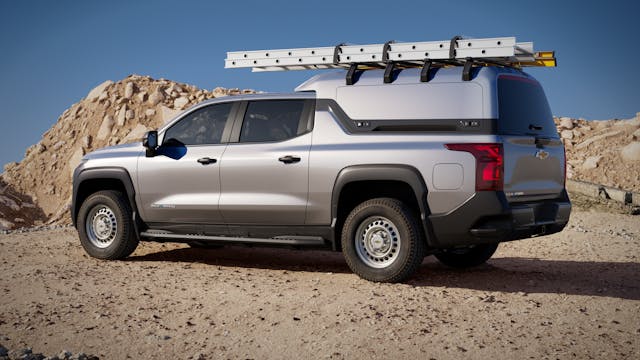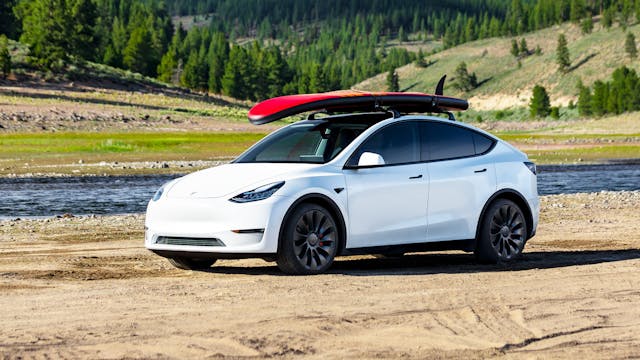Which EVs do, and don’t, qualify for the new tax credits
According to a list released by the Biden administration via the U.S. Treasury Department, nine electric or plug-in hybrid vehicles from seven manufacturers—Audi, BMW, Genesis, Nissan, Rivian, Volkswagen, and Volvo—no longer qualify for either the $3750 or the $7500 tax credit provided by the Inflation Reduction Act of 2022.
The vehicles that no longer qualify are the electric 2023 Audi Q5 e Quattro Plug-in Hybrid, the 2021–23 BMW 330e Plug-in Hybrid, the 2021–23 BMW X5 xDrive45e Plug-in Hybrid, the 2023–24 Genesis GV70, the 2021–23 Nissan Leaf, the 2022–23 Rivian R1S, the 2022–23 Rivian R1T, the 2023 Volkswagen ID.4, and the 2022–23 Volvo S60 Plug-in Hybrid.

The Inflation Reduction Act provided for buyers who meet certain income levels to claim a tax credit of up to $7500 for North American–assembled, new EVs that also meet sticker price restrictions.
Starting Tuesday, the credit will be divided, with $3750 available for an EV that has at least 40 percent of the value of its battery’s critical minerals extracted or processed in the U.S. If that same percentage of ingredients is sourced from a country with whom the U.S. has a free-trade agreement, such as Mexico and Canada, or from materials that were recycled in North America, the vehicle also qualifies.
An additional $3750—in other words, the full $7500—is available if at least half of the value of the EV’s battery components are made or assembled in North America.
Here are the vehicles eligible for the $3750 tax credit (the Tesla Model 3 is double-listed due to variants):
- 2022–23 Ford E-Transit
- 2022–23 Ford Mustang Mach-E

- 2022–23 Ford Escape Plug-in Hybrid
- 2022–23 Lincoln Corsair Grand Touring
- 2022–23 Jeep Wrangler Plug-in Hybrid 4xe [both the Rubicon variant and the Sport S 4xe]

- 2022–23 Jeep Grand Cherokee Plug-in Hybrid 4xe
- 2022–23 Tesla Model 3 (Standard Range Rear-Wheel Drive)
Here are the vehicles eligible for the full $7500:

- 2024 Chevrolet Blazer EV
- 2024 Chevrolet Equinox EV
- 2022–23 Chevrolet Bolt and Bolt EUV

- 2022–23 Chrysler Pacifica Plug-in Hybrid
- 2022–23 Ford F-150 Lightning

- 2022–23 Lincoln Aviator Grand Touring
- 2022–23 Tesla Model 3 (Performance)
- 2022–23 Tesla Model Y (All-Wheel Drive)

- 2022–23 Tesla Model Y (Long Range All-Wheel Drive)
- 2022 Tesla Model Y (Performance)
***
Check out the Hagerty Media homepage so you don’t miss a single story, or better yet, bookmark it. To get our best stories delivered right to your inbox, subscribe to our newsletters.



This is becoming a major mess as how the government always makes things.
These higher end models should be sold as is as most paying that much are buying rebate or not.
The low end cars where people who may not be be able to pay more would be more beneficial.
Lets face it Tesla buyers are going to buy no matter what. They are a cult and little stands in their way.
I just saw a new Tesla last weekend and the pain was so orange peeled that you could not see your reflection in it. The original paint on my 2002 Vette was ten time better.
They can not continue to prop up the BEV and they need to let them stand on their own. They also need to be flexible on the 2035 dates as the industry is doing all they can but even ten years may not be enough.
Either way the world is not going to end if we still have ICE on the roads.
That’s exactly the point, the government puts its thumb on the scale to force these vehicles on us. I am a true believer that is the government wasn’t meddling with “tax credits”, regulations and just plain harassment of the automakers, there would be much fewer electric cars on the road. Most people do not want an electric. The ones that do, don’t need the car for anything other than local commutes.
I seriously considered buying a Tesla when gas prices were sky high. What turned me off on the whole battery electric vehicle was when shopping for an electric f150, I saw that the truck can power your house for a few days during an outage.
Well does t that mean that a full battery charge is equivalent to running my house for a few days?
How does that affect my electric bill?
The range was around 300 miles or so empty with no trailer. I can do 300 miles in my raptor pulling my trailer loaded with one of my classic cars for less than $100 with these gov inflated gas prices.
The more I am required to deal with the government, the more I see what a mess they make of things.
I say let the market decide. First adopters will always pay the higher price to get in early while the technology develops, and eventually costs and economies of scale bring it in reach of the masses. There is no need to subsidize EV technology – it is never good for the free markets when the government starts picking the winners and losers.
So the feds are pushing people into electric vehicles, meanwhile the states are adding on surcharges for EV and Hybrid vehicles, adding up to $225 per year to registration fees to make up for the loss in gas tax revenue.
More taxpayer subsidies for the American car companies. Good luck finding any of the qualified vehicles anywhere near the necessary price point, except the Bolt. This does little to get American’s to adopt EV’s sooner. Politics at it’s best.
The government is not in the business of letting people having the freedom to choose. You will choose what we let you. Funny enough they are subsidizing rich people’s purchases more than anyone else because most EV’s are pricey for most.
The govt. will start getting more and more negative info regarding shorter than expected battery life, lower range numbers than anticipated, pollution from battery production and disposal… and they’ll brush it under the rug because it doesn’t jive with the agenda.
We should not be subsidizing any private sector product. Especially when they are not means-tested. The people purchasing a Tesla can already afford it. They do not need any help. Nor should they receive any.
Could really care less. How much fossil fuel is burned to make one battery for one EV? Look it up. What are we do with all these EV batteries when they are no longer viable – how exactly are they “ recycled” just some simple questions about the environment.
This is something that I can agree with Elon Musk on: Make it a true level playing field for all by getting rid of all subsidies for EVs and those the fossil fuel industry has benefited from for years.